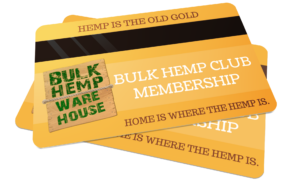
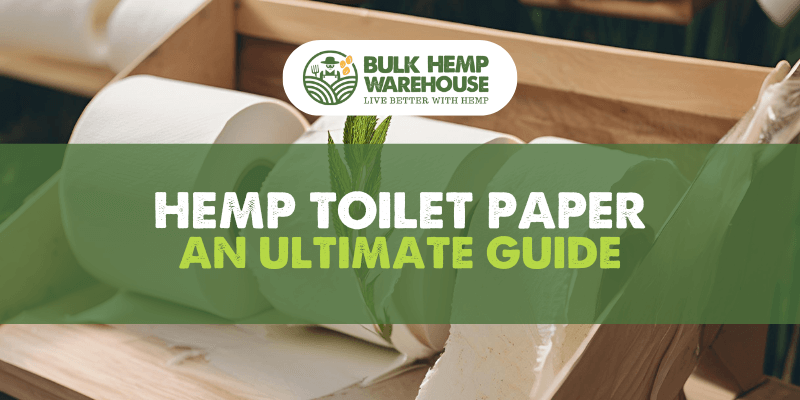
Hemp Toilet Paper: An Ultimate Guide
I’m certain that you’ve been thinking to yourself lately, why isn’t anyone selling hemp toilet paper?
Have you ever thought about how toilet paper affects our planet, and all the trees being cut down?
Hemp toilet paper could change the game, but why hasn’t it yet? Let’s explore that.
It’s a green choice that’s easy on the environment and when done right could still feel good on the toosh.
Hemp toilet paper is made from the hemp fiber plant stalk. It’s better for the earth than regular toilet paper – but no one is offering it, and for good reason.
Hemp grows fast and needs little water, unlike trees that take many years to grow.
Traditional toilet paper is not friendly to our forests.
Americans use a lot of it, cutting down millions of trees.
Hemp toilet paper is a better choice in many ways, but it’s not cost effective.
It uses less water and grows faster than trees – and is therefore more renewable.
Hemp toilet paper also breaks down easily and requires far fewer chemicals than regular tree-based toilet paper.
It’s good for you and the planet and is definitely an eco-friendly toilet paper option.
In this article you will discover the process of making hemp paper, and since the process is still so expensive why the majority of this tissue product is still not commercially available.
Key Takeaways
- Hemp toilet paper is a sustainable alternative to traditional toilet paper
- One acre of hemp produces as much pulp as four acres of trees
- Hemp grows in just four months, compared to 20-80 years for trees
- Hemp toilet paper production uses fewer chemicals and resources
- Switching to hemp toilet paper can significantly reduce your environmental impact
What is Hemp Toilet Paper, and what is the Process of Making Toilet Paper with Hemp Fibers?
Hemp toilet paper is a green choice instead of regular wood-based products, but requires more processing and a much higher cost of raw goods input.
It’s made from hemp plant fibers, known for being strong, durable, and when processed properly, softend to feel good on the skin.
Using hemp in paper making has many benefits over old ways, but we are still a ways away from having it as an option.
Understanding Hemp Fiber and Its Role in Hemp Paper Production
Hemp fiber has 55% to 77% cellulose, more than wood pulp’s 40% to 45%.
This means hemp makes more paper per acre. One acre of hemp can make as much pulp as four acres of trees.
Hemp grows fast, in just 20 weeks, unlike trees which take 8-20 years.
This makes hemp a good choice for making paper.
The Process of Making Toilet Paper from Hemp
To make hemp toilet paper, fibers are taken from the plant and turned into pulp.
This process uses less water and chemicals than wood pulp.
Hemp pulp can be bleached without chlorine, which is better for the environment.
The paper made from hemp is soft and strong. It’s better for the planet than wood-based paper.
Comparing Hemp Pulp to Wood Pulp in Paper Manufacturing
Hemp pulp is better in many ways:
- More cellulose means more paper can be made
- Hemp grows fast, so it’s good for the planet
- It needs fewer resources and chemicals to make
- The paper is stronger and lasts longer
- Hemp paper can be recycled up to seven times, while wood pulp can only be recycled three times
Choosing hemp toilet paper supports a greener and more efficient paper making process. It helps save trees and gives you a quality product for daily use.
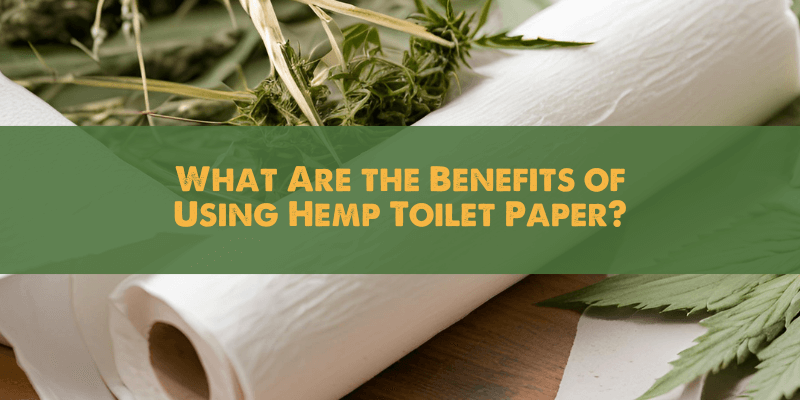
What Are the Benefits of Using Hemp Toilet Paper?
Hemp toilet paper is good for you, your home, and the planet.
It’s becoming more popular because it’s eco-friendly and has many benefits to the health of our homes and our world.
Environmental Advantages of Hemp Toilet Paper
Using hemp toilet paper helps the environment a lot.
One acre of hemp can make as much paper as four acres of trees.
This helps stop too many trees from being cut down.
Hemp has more cellulose than trees, so less volume is needed to make paper products.
This makes hemp toilet paper better for the planet, leaving more oxygen to go into our air and not destroy ancient eco-systems that support the biodiversity of our planet.
Also, when hemp tissue paper, or products like hemp toilet paper break down in our waterways it’s not leaving behind toxic chemical residues.
Softness and Durability: Hemp Products are A Comfortable Choice
Hemp toilet paper is surprisingly soft and strong.
Its natural fibers feel good on your skin.
It’s also made to last longer, so you use less of it.
Not that you’re going to re-use your toilet paper, but when it comes to making other hemp-based paper products like paper towels or napkins they will be more absorbent and you’ll need less of them.
Health Benefits of Switching to Hemp Toilet Paper When it Becomes Available
Hemp toilet paper is good for your health.
Hemp fibers have been known to have some pretty amazing properties some of which fight bacteria.
This makes it cleaner than regular toilet paper.
It’s made with fewer harsh chemicals.
This makes it kinder to your skin and less likely to cause irritation.
| Aspect | Hemp Toilet Paper | Conventional Toilet Paper |
|---|---|---|
| Environmental Impact | Low – Sustainable and biodegradable | High – Contributes to deforestation |
| Recyclability | Can be recycled 7 times | Can be recycled 3 times |
| Chemical Processing | Minimal, eco-friendly | Often involves harsh chemicals |
| Antibacterial Properties | Natural antibacterial compounds | Limited or none |
Choosing hemp toilet paper is good for you and the planet.
It’s soft, durable, and supports sustainable practices.
Hemp benefits everyone, making our future greener.
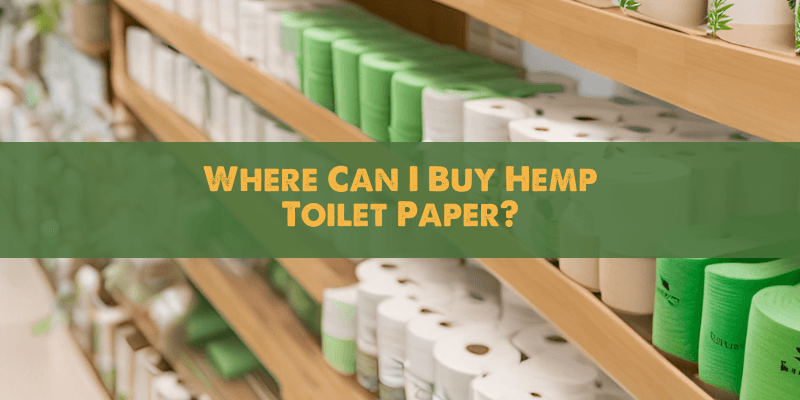
Where Can I Buy Hemp Toilet Paper?
Hemp toilet paper is becoming more popular as a green choice in different conversations.
It’s not easy to find in regular stores, or anywhere online for that matter, and for good reason.
Hemp toilet paper is still extremely expensive to produce, so unless you want to be wiping your rear with dollar bills, that’s pretty much what it would equate to at the moment.
Of course I’m exaggerating but it a toilet roll costs about $.10 to make a hemp toilet paper roll would cost roughly 100 – 1000 times that.
It comes down to a few things, but mainly it has to do with economy of scale.
We just don’t have enough hemp stalks available to continually operate a toilet paper making machine.
And no toilet paper making company has the funding or luxury of shutting down it’s operations to start experimenting with hemp fibers… or at least none of them have stepped up to the plate.
Top Hemp Toilet Paper Brands you Might Find
You will likely come across a brand called Hempies Paper, but they are just a conceptual project at this time.
You will also find that you can search for hemp toilet paper for sale on Alibaba but none of the options are true authentic genuine hemp. So don’t fall for their false marketing if you do find one.
I’m certain that it will become a reality in the future, but it just has not happened yet.
Online vs. In-Store Shopping for Hemp Toilet Paper
Again, if you’re hoping to walk into your local health food store and find hemp toilet paper it’s just not going to happen. As much as we all want to see it, we are just not there yet.
I would certainly continue searching online and find groups that are talking about it and keep up to speed with the latest concepts, so that when it does happen you’ll be one of the first to know!
Pricing Comparison: Hemp vs. Conventional Toilet Paper
Hemp toilet paper would cost a lot more than regular toilet paper.
This is because of the rare materials and extra steps needed to make it.
But, many people think it’s worth it for the planet.
But when it comes down to it, how many of them are willing to pay the price. Probably less than 1%.
Here’s a few fun facts of hemp paper vs conventional paper products.
| Aspect | Hemp Paper | Conventional Paper |
|---|---|---|
| Cellulose Content | 55-77% | 40-45% |
| Recycling Potential | Up to 7 times | Up to 3 times |
| Land Efficiency | 1 acre = 4+ acres of trees | 4 acres needed |
| Availability | Limited | Widely available |
| Price Range | Higher | Lower |
Hemp toilet paper has big environmental benefits. But, it’s impossible to find.
For those who want to live green, looking into hemp toilet paper is worth it.
As more people want it, we might see an investor/company start investing in it’s production and make it available on the market.
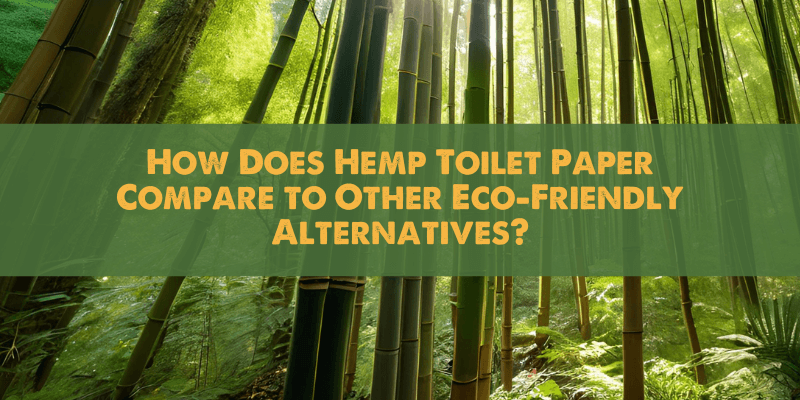
How Does Hemp Toilet Paper Compare to Other Eco-Friendly Alternatives?
Looking for green toilet paper?
You might see hemp, bamboo, and recycled options.
Each has its own good and bad points.
Hemp Toilet Paper vs. Bamboo Toilet Paper
Hemp and bamboo toilet paper are both green choices.
Hemp grows fast, making more rolls than trees.
It also fights bacteria, making it healthier.
Bamboo is easier to find and cheaper.
But toilet paper made from hemp is a cleaner process for the environment.
Hemp Toilet Paper vs. Recycled Toilet Paper
Recycled toilet paper is green, but it needs more chemicals.
Hemp needs less chemical treatment.
It’s also stronger, lasting longer.
Hemp paper can be recycled seven times.
Wood-based recycled paper can only be recycled three times.
| Feature | Hemp Toilet Paper | Bamboo Toilet Paper | Recycled Toilet Paper |
|---|---|---|---|
| Growth Rate | Few months | 3-5 years | N/A (Recycled) |
| Antibacterial Properties | Yes | No | No |
| Chemical Treatment | Minimal | Moderate | Significant |
| Recyclability | 7 times | 3-4 times | 3 times |
Hemp is the best for the planet.
It grows fast, needs few chemicals, and can be recycled many times.
Your choice might depend on what’s available, how much it costs, and what you like.
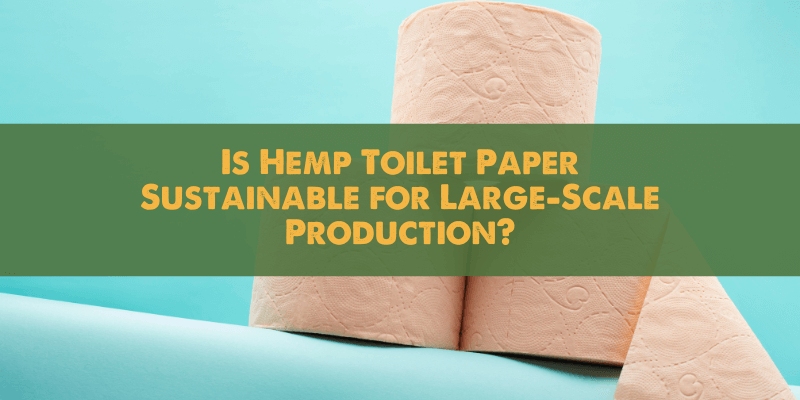
Is Hemp Toilet Paper Sustainable for Large-Scale Production?
Hemp toilet paper is a new option being considered in the sustainable toilet paper market.
It’s seen as a good choice for making lots of paper.
We’ll look at how hemp grows and if it can replace wood pulp.
Hemp Cultivation and Its Impact on the Paper Industry
Hemp growing has many benefits for paper making:
- Grows fast, ready in 4-5 months
- Makes more cellulose fibers than trees
- Needs less pesticides and herbicides
- Improves soil and cleans chemicals
Hemp is a great choice for making green toilet paper.
The paper world, which uses a lot of wood pulp, could use more hemp.
Potential for Hemp to Replace Wood Pulp in Paper Products
Hemp could be a better choice than wood pulp for many papers:
- Hemp paper can be recycled 8 times, not 3 like wood pulp
- It’s cheaper to make than regular toilet paper
- Hemp hurds fight off germs, making products better
Switching to hemp paper could solve some big environmental problems.
Here are some facts:
| Environmental Impact | Traditional Paper | Hemp Paper |
|---|---|---|
| Deforestation | 15% for toilet tissue | Minimal impact |
| Water Contamination | 70,000 liters per ton | Significantly less |
| Air Toxics (USA) | 20% from pulp production | Lower emissions |
As people want more green products, the paper world might change.
Using hemp for paper could make a big difference.
It could help make a greener future.
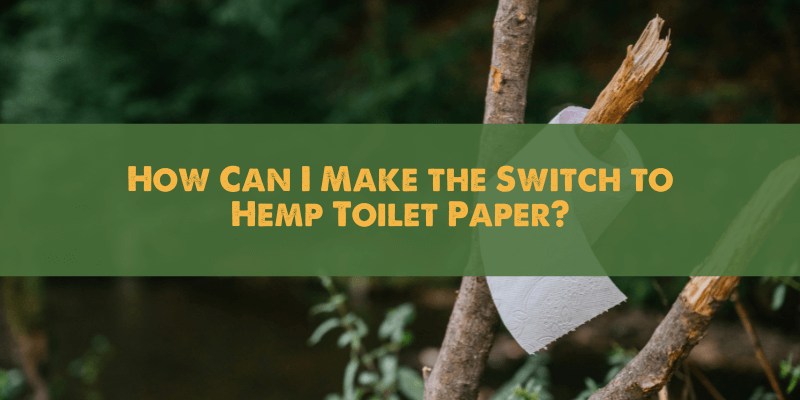
How Can I Make the Switch to Hemp Toilet Paper?
Switching to hemp toilet paper is a smart move for your sustainable lifestyle – once it’s available.
The average American uses 141 rolls a year.
Making this change can greatly reduce your environmental impact.
Hemp toilet paper is more biodegradable than other types.
It breaks down quickly and uses less water.
This makes it a better choice for our planet.
Tips for Transitioning from Traditional to Hemp Toilet Paper
Start by buying investing in other hemp paper products and hemp in general.
This will help continue supporting hemp-based products and companies, and raise awareness about the immense benefit this miraculous plant has to offer.
You might notice it feels different and better than regular products.
Hemp products are just better for the environment.
It needs less energy, water, and chemicals to grow and process into products.
This is good for your wallet and the planet.
Incorporating Hemp Toilet Paper into a Sustainable Lifestyle
Using hemp toilet paper is just one step towards a greener lifestyle.
One acre of hemp can make as much pulp as four acres of trees.
This means hemp is a more sustainable choice.
Hemp requires little water and no pesticides.
Plus, hemp paper can be recycled seven times, not just three like wood-based paper.
Switching today helps reduce the 28 million hectares of forest cut down each year.
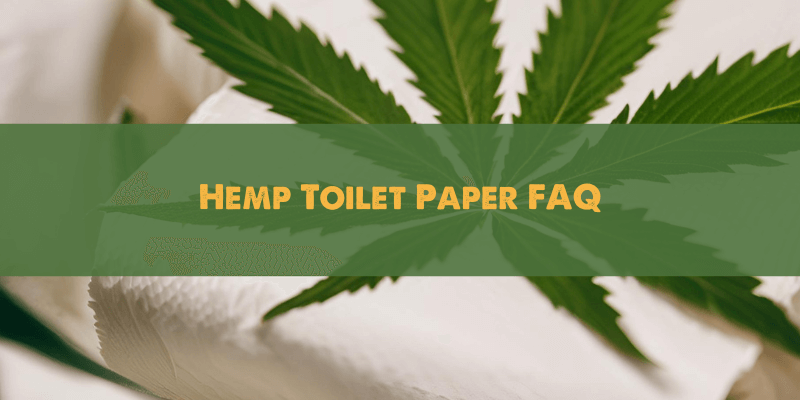
Extensive Hemp Toilet Paper FAQ
Q: What is hemp toilet paper?
A: Hemp toilet paper is a type of tissue paper made from the fibers of the hemp plant, rather than traditional wood pulp.
It’s an eco-friendly alternative to conventional toilet paper, offering similar softness and durability while being more sustainable.
Q: What are the benefits of hemp toilet paper?
A: The benefits of hemp toilet paper include its sustainability, as hemp grows much faster than trees and can produce more pulp for paper.
It’s also biodegradable, requires fewer chemicals in production, and is naturally antibacterial.
Additionally, hemp toilet paper is soft, strong, and can be more environmentally friendly than paper made from trees.
Q: How is paper made out of hemp?
A: The process of turning hemp into paper involves harvesting the hemp plants, separating the long bast fibers from the woody core, and then processing these fibers into pulp.
This pulp is then pressed and dried to create paper.
The hemp cellulose fibers are naturally strong, making them ideal for paper production.
Q: Is hemp toilet paper as soft as regular toilet paper?
A: Yes, hemp toilet paper is soft and comfortable to use.
The hemp cellulose fibers can be processed to create a texture similar to traditional toilet paper.
Many users report that hemp toilet paper is just as soft as conventional options, if not softer.
Q: How does hemp toilet paper compare to wood pulp paper in terms of environmental impact?
A: Hemp toilet paper has a lower environmental impact compared to wood pulp paper.
Hemp crops grow much faster than trees, require less water, and can produce up to four times as much pulp for paper as trees.
Additionally, hemp cultivation doesn’t require pesticides or herbicides, making it a more eco-friendly choice for toilet paper production.
Q: Can hemp toilet paper help reduce deforestation?
A: Yes, the use of hemp for toilet paper production can significantly help reduce deforestation.
Since hemp can produce much more pulp for paper than trees in a shorter time frame, it can decrease the demand for wood-based paper products.
This shift could lead to less pressure on forests and contribute to conservation efforts.
Q: Is hemp toilet paper more expensive than regular toilet paper?
A: Hemp toilet paper can be slightly more expensive than conventional toilet paper due to the current scale of production and availability.
However, as demand increases and production methods improve, the price is expected to become more competitive. Many consumers find the environmental benefits worth the small additional cost.
Q: How does the production of hemp toilet paper compare to traditional toilet paper?
A: The production of hemp toilet paper generally requires fewer chemicals and less water compared to traditional toilet paper made from trees.
Hemp paper can be processed using more environmentally friendly methods, and the plant itself is naturally resistant to pests, reducing the need for harmful pesticides during cultivation.
Q: Can hemp toilet paper be flushed safely?
A: Yes, hemp toilet paper can be flushed safely. Like traditional toilet paper, it’s designed to break down quickly in water.
In fact, due to the natural properties of hemp fibers, hemp toilet paper may even decompose faster than some conventional options, making it safe for most plumbing systems.
Where can you purchase hemp toilet paper?
A: Hemp toilet paper is becoming increasingly available as more consumers seek eco-friendly alternatives.
You can find hemp toilet paper in some health food stores, eco-friendly shops, and through various online retailers.
As demand grows, it’s likely to become more widely available in mainstream supermarkets and stores.
How is hemp toilet paper made?
The process is not dis-similar to making regular toilet paper, it would just require more softening than when making tree-pulp paper.
Hemp toilet paper is made using the fibers from the hemp plant instead of traditional wood or recycled paper.
Here’s how the process differs:
- Gathering Materials:
- Hemp Cultivation: Farmers grow hemp plants, which mature quickly—usually within a few months. Hemp requires less water and fewer pesticides than trees, making it a more sustainable option.
- Harvesting Hemp: The stalks of the hemp plant are harvested for their fibers.
- Processing the Hemp Fibers:
- Fiber Separation: The outer part of the hemp stalk, called the bast fiber, is separated from the inner core. This is done through a process called retting, which breaks down the plant tissues binding the fibers.
- Pulping: The separated fibers are then broken down into pulp. Hemp fibers are longer and stronger than wood fibers, which can influence the pulping process.
- Pulping Process:
- Less Harsh Chemicals: Hemp’s natural properties allow for pulping with fewer and less aggressive chemicals compared to wood pulp.
- Mechanical or Chemical Pulping: Hemp can be pulped mechanically or chemically, depending on the desired softness and strength of the final product.
- Bleaching (Often Reduced or Omitted):
- Natural Color: Hemp pulp is naturally light in color, so it may not require bleaching. If bleaching is desired, more environmentally friendly agents like hydrogen peroxide can be used instead of chlorine-based bleaches.
- Pressing and Drying:
- Similar Process: The hemp pulp is spread onto screens, pressed to remove water, and then dried into thin sheets, much like traditional paper-making.
- Rolling into Reels:
- Forming Rolls: The dried hemp paper is rolled onto large reels, ready for further processing.
- Texturing and Perforating:
- Embossing: The paper may be embossed with patterns to enhance softness and absorbency.
- Perforation: Lines are added to make tearing the toilet paper into sheets easier.
- Cutting and Packaging:
- Final Product: The large rolls are cut into consumer-sized rolls and packaged for distribution.
Key Differences from Traditional Toilet Paper:
- Sustainability: Hemp grows much faster than trees (hemp can be harvested in months, trees take years) and is considered more sustainable due to lower resource requirements.
- Pulping Chemicals: Hemp requires fewer and less harmful chemicals during pulping, reducing environmental impact.
- Bleaching Needs: Less or no bleaching is needed for hemp pulp, avoiding the use of harsh chemicals and producing a more natural product.
- Fiber Strength: Hemp fibers are stronger and longer, which can result in a sturdier final product even with thinner sheets.
By using hemp, the production of toilet paper becomes more eco-friendly, utilizing a renewable resource that has a lower environmental footprint compared to traditional wood-based toilet paper.
Why not hemp toilet paper?
Here are six reasons why hemp toilet paper is not widely produced:
- Limited Hemp Cultivation and Supply:
- Historical Restrictions: Hemp cultivation has been restricted or illegal in many countries for decades due to its association with marijuana, despite hemp containing minimal psychoactive compounds.
- Insufficient Supply: Because of these restrictions, there is a limited supply of industrial hemp compared to the vast availability of timber used for traditional paper.
- Higher Production Costs:
- Economies of Scale: The wood pulp industry benefits from established economies of scale, making wood-based toilet paper cheaper to produce.
- Investment in Infrastructure: Producing hemp paper requires different processing equipment. The cost of investing in new machinery can be prohibitive for manufacturers.
- Price Point: Higher production costs may lead to a more expensive end product, which can deter price-sensitive consumers.
- Lack of Processing Infrastructure:
- Specialized Equipment Needed: Hemp fibers require different processing techniques than wood fibers. Many paper mills are not equipped to handle hemp without significant modifications.
- Limited Facilities: There are few facilities that can process hemp into pulp suitable for toilet paper, limiting production capacity.
- Technical Challenges in Product Quality:
- Fiber Characteristics: Hemp fibers are longer and coarser than wood fibers, which can make it challenging to produce the softness expected in toilet paper.
- Additional Processing Required: Achieving a soft texture may require extra processing steps, increasing production time and cost.
- Low Consumer Awareness and Demand:
- Lack of Awareness: Many consumers are unaware of hemp toilet paper as an option.
- Misconceptions About Hemp: Associations with marijuana may make consumers hesitant to purchase hemp products.
- Market Risk: Manufacturers may be unwilling to produce a product without proven consumer demand.
- Regulatory and Legal Barriers:
- Complex Regulations: Even where hemp cultivation is legal, navigating the regulatory landscape can be complicated and discouraging for producers.
- Import/Export Restrictions: International trade of hemp products can be hindered by varying laws between countries, affecting the global supply chain.
These factors contribute to the rarity of hemp toilet paper in the market. Overcoming these challenges would require changes in regulations, increased consumer demand, and significant investment in processing infrastructure.
Where to buy hemp toilet paper Canada?
You can’t. In fact, hemp toilet paper is not available anywhere on Earth at the moment. There may be a few people doing very small artisan experimental production, but nothing commercially available.
Why hemp toilet paper is the future?
This entire article pretty much covers that, so go back and read through it if you haven’t already.
Explore Other Posts by Bulk Hemp Warehouse
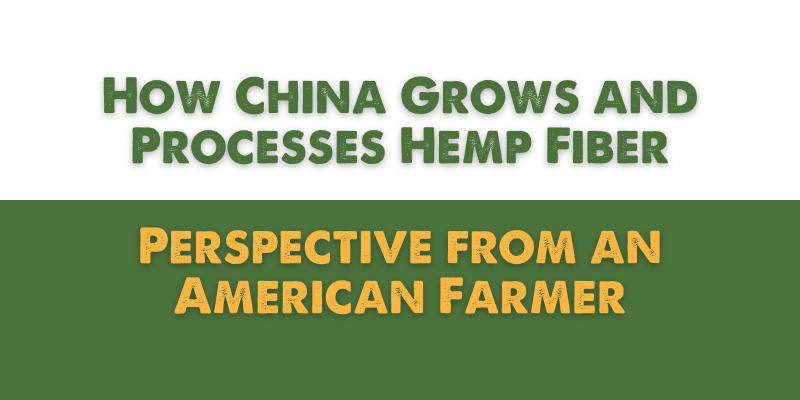
How China Grows and Processes Hemp Fiber – From an American Farmer
Steve Groff, a third-generation farmer from Southeastern Pennsylvania, recently embarked on a transformative journey to China, a trip that has profoundly impacted his perspective on the future of hemp farming and textile production. This wasn’t a casual tourist visit; it

10 Ways to Use Hemp for the Holidays
The holiday season is a time for creativity, warmth, and celebration. Hemp, with its versatility and sustainable nature, offers endless opportunities to make your holiday festivities more eco-friendly and unique. Whether you’re looking for gift ideas, decorations, or a way
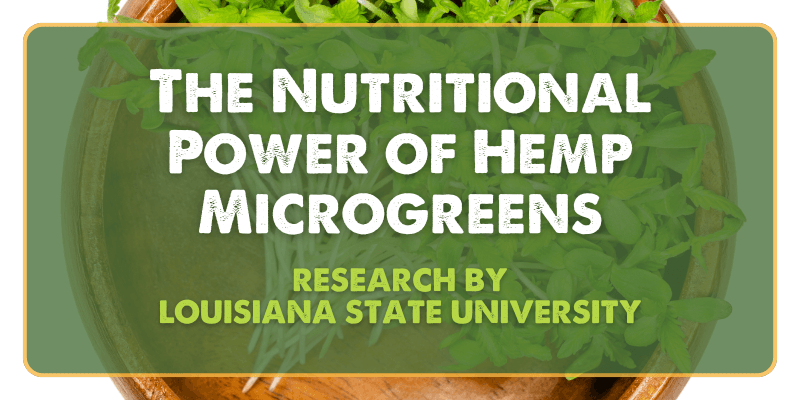
The Nutritional Promise of Hemp Microgreens with LSU
Imagine stepping into a vibrant farmer’s market, where the air is rich with the smell of fresh greens. Amongst the array of colorful vegetables, you spot trays of delicate microgreens. What if I told you that one of these tiny







